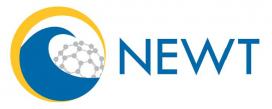Electrified Membranes (EM) for Transformation of Nitrate in Wastewaters
Post-doctoral researcher Lea Winter of the National Science Foundation (NSF)’s Nanosystems Engineering Research Center (nERC) for Nanotechnology Enabled Water Treatment (NEWT), headquartered at Rice University, has demonstrated nitrate (NO3) reduction activity of earth-abundant interstitial alloy (VOxNy) for the first time.
Nitrate electrocatalytic conversion can address risks to human health and the environment caused by nitrate pollution. Current methods are limited by mass transport, lack of scalability, and high costs due to the use of precious metals. Scalable electrified membranes with earth-abundant catalysts could enhance nitrate reduction activity and control reaction selectivity. Beyond denitrification to nitrogen (N2,), opportunities may exist to mine wastewaters for fertilizer and fit-for-purpose water.
NEWT post-doc Lea Winter (now an Assistant Professor of Chemical & Environmental Engineering at Yale) sought to develop conductive, active, selective, stable, and scalable electrocatalytic membranes functionalized with earth abundant transition metal oxynitride catalysts to control nitrate electrochemical reduction to N2 or ammonia (NH3). Polymeric-carbonaceous composite membranes were fabricated and functionalized with transition metal oxynitride catalysts. The NEWT researchers then evaluated the influence of different filtration conditions, applied voltage, and structural and electronic properties of materials on nitrate reduction.
The researchers found that the novel formulation of a polymeric-carbonaceous composite enables a conductive and permeable electrified membrane (EM) with stable operation over more than seven hours. Using the conductive, stable, and permeable Ems with rGO support for electrified filtration, Winter significantly enhanced NO3 conversion and N2 selectivity compared with diffusion mode.
The work was presented as part of the Young Investigators Lecture Series at the California Institute of Technology in February 2022; Winter won an award for the oral presentation.. Additional talks were given at the Solvay Institutes Workshop on Plasma Technology and Other Green Methods for Nitrogen Fixation in Brussels; the American Chemical Society (ACS)’s Annual Meeting in Atlanta, GA; and, the Stanford SLAC Water Group Seminar. Undergraduate mentee, Amma Kankam, earned a first-place award for a poster presentation at the Alchemical Engineering Annual Meeting (AIChE). The research was published in ACS ES&T Engineering in 2021.



